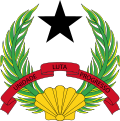| Country | Formal Relations Began | Notes |
|---|
 Angola Angola | | |
 Brazil Brazil | 22 November 1974 | See Brazil–Guinea-Bissau relations |
 Cape Verde Cape Verde | 5 July 1975 | See Cape Verde–Guinea-Bissau relations Both countries established diplomatic relations on 5 July 1975 [34] The Republic of Cape Verde islands are about 900 km north-west of Guinea-Bissau. Both were colonies of the Portuguese Empire and they campaigned together for independence with a plan for unification, but the countries separated after 1980. [125] [126] - Cape Verde has an embassy in Bissau.
- Guinea-Bissau has an embassy in Praia.
|
 China China | 15 March 1974, broken 31 May 1990, Restored 23 April 1998 [127] | See China–Guinea-Bissau relations - China has an embassy in Bissau.
- Guinea-Bissau has an embassy in Beijing.
|
 Czech Republic Czech Republic | 19 October 1973 | - Both countries established diplomatic relations in 1973 (with Czechoslovakia) and in 1993. [128]
- Czech Republic is accredited to Guinea-Bissau from its embassy in Accra, Ghana. [129] [128]
|
 Egypt Egypt | 11 June 1974 | Both countries established diplomatic relations on 11 June 1974 [130] - Egypt is accredited to Guinea-Bissau by its embassy in Conakry, Guinea. [131]
- Both countries are full member of the African Union.
|
 Hungary Hungary | 15 October 1973 | Both countries established diplomatic relations on 15 October 1973 [132] Hungary is represented in Guinea-Bissau by its embassy in Lisbon, Portugal. [133] |
 Mozambique Mozambique | 9 June 1976 | Both countries established diplomatic relations on 9 June 1976 [43] - Guinea-Bissau is accredited to Mozambique from its Ministry of Foreign Affairs in Bissau.
- Mozambique is accredited to Guinea-Bissau from its Ministry of Foreign Affairs in Maputo.
- Both nations also conduct diplomatic relations from their respective ambassadors accredited to the CPLP in Lisbon, Portugal.
|
 Portugal Portugal | 10 September 1974 | See Guinea-Bissau–Portugal relations Both countries established diplomatic relations on 10 September 1974. [134] - Guinea-Bissau has an embassy in Lisbon and a consulate-general in Albufeira.
- Portugal has an embassy in Bissau.
|
 Russia Russia | 6 October 1973 | See Guinea-Bissau–Russia relations Both countries established diplomatic relations on 6 October 1973. [135] |
 Senegal Senegal | 10 August 1974 | Both countries established diplomatic relations on 10 August 1974, when the first ambassador of Senegal Saer Gaye presented his credentials to the head of state Luis Cabral [136] - Guinea-Bissau has an embassy in Dakar and a consulate-general in Ziguinchor.
- Senegal has an embassy in Bissau.
|
 Serbia Serbia | 10 May 1974 | - Both countries established diplomatic relations on 10 May 1974 when Bozidar Stanic , Yugoslav Ambassador to Guinea-Bissau, presented his credentials to President Luis Cabral. [13]
- On 8 December 2017, Serbia unilaterally decided to abolish visa for of all types of passports of Guinea-Bissau. [137]
- Guinea-Bissau denies to have recognized Kosovo. [138]
|
 Spain Spain | 3 March 1975 | See Guinea-Bissau–Spain relations Both countries established diplomatic relations on 3 March 1975 [139] - Guinea-Bissau has an embassy in Madrid.
- Spain has an embassy in Bissau.
|
 Sweden Sweden | 14 March 1975 | See Guinea-Bissau–Sweden relations Both countries established diplomatic relations on 14 March 1975 when Sweden's first Ambassador to Guinea-Bissau , Mr. D. Friedman , presented his credentials to President Louis Cabral. [32] - Guinea-Bissau is accredited to Sweden from its embassy in Brussels, Belgium and maintains an honorary consulate in Stockholm.
- Sweden is accredited to Guinea-Bissau from its embassy in Lisbon, Portugal.
|
 East Timor East Timor | 11 November 2021 | Both countries established diplomatic relations on 11 November 2021 when Ambassador of Guinea-Bissau (resident in Beijing) Mr. Antonio Serifo Embalo presented his credentials to President Timor Leste Francisco Guterres Lu-Olo. [140] - Timor-Leste is accredited to Guinea-Bissau from its Ministry of Foreign Affairs in Dili.
- Guinea-Bissau is accredited to Timor-Leste from its Ministry of Foreign Affairs in Bissau.
- Both nations also conduct diplomatic relations from their respective ambassadors accredited to the CPLP in Lisbon, Portugal.
|
 Turkey Turkey | | See Guinea-Bissau–Turkey relations - Guinea-Bissau has an embassy in Ankara.
- Turkey has an embassy in Bissau.
- Trade volume between the two countries was US$4.95 million in 2019. [141]
|
 Ukraine Ukraine | 12 February 2009 | Both countries established diplomatic relations on 12 February 2009 [142] |
 United Kingdom United Kingdom | 1975 | See Foreign relations of the United Kingdom Guinea-Bissau established diplomatic relations with the United Kingdom on 12 March 1975. - Guinea-Bissau does not maintain an embassy in the United Kingdom.
- The United Kingdom is not accredited to Guinea-Bissau through an embassy; the UK develops relations through its embassy in Dakar, Senegal. [144]
The UK governed parts of Guinea-Bissau from 1792 to 1870, when it was transferred to Portugal. Both countries share common membership of the World Trade Organization. |
 United States United States | 3 September 1975 | See Guinea-Bissau–United States relations Both countries established diplomatic relations on 3 September 1975 [145] The U.S. Embassy suspended operations in Bissau on 14 June 1998, in the midst of violent conflict between forces loyal to then-President Vieira and the military-led junta. Prior to and following the embassy closure, the United States and Guinea-Bissau have enjoyed excellent bilateral relations. - Guinea-Bissau is accredited to the United States from its Permanent Mission to the United Nations in New York City.
- United States is accredited to Guinea-Bissau from its embassy in Dakar, Senegal.
|


